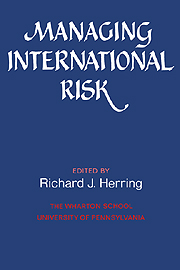 Managing International Risk
Managing International Risk Book contents
- Frontmatter
- Contents
- List of contributors
- Acknowledgments
- Introduction and overview
- 1 Managing risks to the international economic system
- Perspective: Political threats to the international economic system
- Perspective: The crisis of exogeneity, or our reduced ability to deal with risk
- 2 Country risk: economic aspects
- 3 Political risk: analysis, process, and purpose
- 4 Country risk: social and cultural aspects
- Perspective: The risks of lending to developing countries
- Perspective: Country risk, a banker's view
- Perspective: Managing country risk for a manufacturing corporation
- 5 Organizational and institutional responses to international risk
- Perspective: Organizational strategies for coping with country risk
- 6 Insuring against country risks: descriptive and prescriptive aspects
- Perspective: Country risk insurance, an insurer's view
- Index
Perspective: The crisis of exogeneity, or our reduced ability to deal with risk
Published online by Cambridge University Press: 07 May 2010
- Frontmatter
- Contents
- List of contributors
- Acknowledgments
- Introduction and overview
- 1 Managing risks to the international economic system
- Perspective: Political threats to the international economic system
- Perspective: The crisis of exogeneity, or our reduced ability to deal with risk
- 2 Country risk: economic aspects
- 3 Political risk: analysis, process, and purpose
- 4 Country risk: social and cultural aspects
- Perspective: The risks of lending to developing countries
- Perspective: Country risk, a banker's view
- Perspective: Managing country risk for a manufacturing corporation
- 5 Organizational and institutional responses to international risk
- Perspective: Organizational strategies for coping with country risk
- 6 Insuring against country risks: descriptive and prescriptive aspects
- Perspective: Country risk insurance, an insurer's view
- Index
Summary
Introduction
In Chapter 1, Richard Cooper has given us a masterly description of the possible sources of crisis at the beginning of the 1980s. In all the areas he covered (foreign exchange crises, banking crises, trade wars, and oil crises) the source of the risk did not lie in nature but, at least in part, in voluntary human actions. I could not avoid comparing this description with some of his previous work (e.g., The Economics of Interdependence, 1968) where the problem was basically identified as a game against nature. In that framework, the conscious actors were national governments of industrialized countries who addressed their set of policy instruments to the attainment of economic targets. Other operators were not assumed to react significantly to the actions of governments. Rather, their behavior was, in the aggregate, analogous to that of impersonal, natural forces. Of course, the growing interdependence of Western industrialized economies was creating crossdependencies between each nation's pursuit of legitimate objectives and a solution had to be found to this problem. The basic framework, however, was still one in which people, through their democratically elected governments, tried to manipulate impersonal forces to in crease their welfare. In our day, instead, the game looks much more like one of humans against other humans, with every player reacting to the actions of all other players.
- Type
- Chapter
- Information
- Managing International RiskEssays Commissioned in Honor of the Centenary of the Wharton School, University of Pennsylvania, pp. 59 - 74Publisher: Cambridge University PressPrint publication year: 1983
